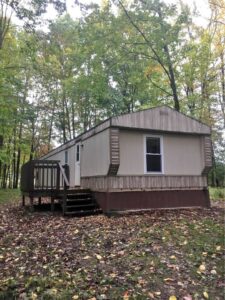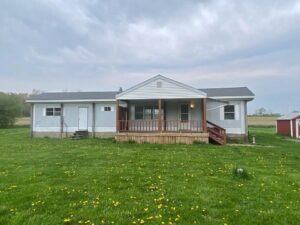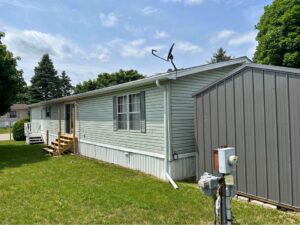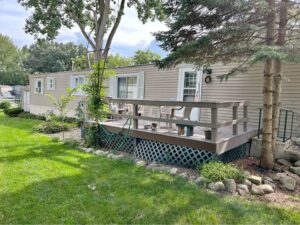Is your mobile home showing signs of wear and tear? Are you wondering if it’s time for a replacement? Look no further! Mobile home replacement is the solution you’ve been searching for. Whether it’s outdated features, structural issues, or simply the desire for a fresh start, replacing your mobile home can transform your living space into something new and exciting.
Mobile Home Replacement: Built on Your Land
But before diving into this venture, it’s essential to understand the basics. From manufactured homes to mobile home parts and outfitters, there are various factors to consider. As a homeowner, you need to weigh your options carefully. Should you invest in a new home or opt for replacement parts?
Ready for an upgrade? Let’s explore the world of mobile home replacement together!
Understanding the Benefits of Mobile Home Replacement
Enhancing energy efficiency through mobile home replacement
One of the key benefits is the opportunity to enhance energy efficiency. Older mobile homes often lack proper insulation and have outdated heating and cooling systems, resulting in high energy bills and discomfort for the residents. By replacing your old mobile home with a newer model, you can take advantage of advanced technologies that promote energy efficiency.

Newer mobile homes are built with improved insulation materials that help retain heat during winter and keep the interior cool during summer. They come equipped with energy-efficient windows that minimize heat transfer and reduce reliance on artificial lighting. These features contribute to lower utility costs by reducing the need for excessive heating or cooling.
Furthermore, many modern mobile homes now offer options for renewable energy sources such as solar panels. By harnessing solar power, homeowners can significantly reduce their carbon footprint while enjoying substantial savings on electricity bills. This eco-friendly approach not only benefits the environment but also helps create a sustainable living space.
You might also be interested in our article:
Improving safety and durability with a new mobile home
Another compelling reason to consider mobile home replacement is the improvement in safety and durability that comes with a new unit. Over time, older mobile homes may develop structural issues or suffer from wear and tear due to exposure to various weather conditions.
By investing in a replacement, you can ensure that your new mobile home meets current safety standards and regulations. Newer models often incorporate advanced construction techniques and materials designed to withstand extreme weather events such as hurricanes or earthquakes. This provides peace of mind knowing that your family’s safety is prioritized.
Moreover, modern mobile homes are built using durable materials that require minimal maintenance compared to their older counterparts. With better resistance against moisture damage and pests, you can enjoy a longer lifespan for your investment without worrying about costly repairs or replacements.
Increasing property value by replacing your old mobile home
In addition to enhancing energy efficiency and improving safety, replacing your old mobile home can also increase the overall value of your property. Potential buyers are often attracted to newer mobile homes that offer modern amenities and updated features.
A new mobile home can significantly boost the curb appeal of your property, making it more attractive to potential buyers. The improved energy efficiency and durability mentioned earlier can be strong selling points when putting your property on the market.

By investing in a replacement, you not only create a comfortable living space for yourself but also position your property as a desirable option for future buyers. This can lead to higher resale value and potentially faster sales when compared to older mobile homes that lack these advantages.
Mobile & Manufactured Home Replacement Program: Process and Requirements
The government-sponsored mobile home replacement program offers assistance to individuals looking to replace their outdated or damaged mobile homes. This program aims to improve living conditions and provide safer housing options for those in need. If you’re considering participating in the mobile home replacement program, here is a step-by-step guide on how to get started.
Overview of the Program
The mobile home replacement program is designed to help individuals replace their old or dilapidated mobile homes with newer, more energy-efficient models. By doing so, it not only enhances the quality of life but also contributes to environmental sustainability. The program provides financial support through various avenues such as grants, loans, and financing options.
Eligibility Criteria
To qualify for the mobile home replacement program, certain eligibility criteria must be met. These requirements typically include:
Proof of ownership: Applicants must provide documentation that proves ownership of the existing mobile home.
Income verification: The program often considers income levels to determine eligibility for financial assistance.
Age and condition of the mobile home: Generally, older and more deteriorated homes have a higher chance of qualifying for the replacement program.
Compliance with local regulations: Mobile homes seeking participation in the program must adhere to specific building codes and standards set by local authorities.
Documentation Needed: Mobile Home Replacement
When applying for the mobile home replacement program, several documents are typically required to complete your application successfully:
Proof of identification (e.g., driver’s license or passport)
Proof of ownership (e.g., title deed or registration)
Income verification documents (e.g., pay stubs or tax returns)
Current utility bills
Building permits (if applicable)
Any additional documentation requested by the program administrators
How to Participate: Mobile Home Replacement
Participating in the mobile home replacement program involves following a series of steps that ensure a smooth process from start to finish:
Research and find local programs: Begin by researching the available mobile home replacement programs in your area. Check with government agencies, non-profit organizations, or housing authorities to identify suitable options.
Gather necessary documents: Collect all the required documentation mentioned earlier to support your application.
Contact program administrators: Reach out to the relevant program administrators to inquire about specific requirements and procedures.
Submit your application: Complete the necessary forms and submit them along with the requested documentation within the designated timeframe.
Await approval: After submitting your application, patiently wait for a response from the program administrators regarding your eligibility for participation.
Follow-up with additional steps: If approved, you will be guided through subsequent steps such as selecting a replacement mobile home, securing financing or grants, and arranging for transportation or installation.
By following these steps and meeting the program’s requirements, you can take advantage of the mobile home replacement initiative and improve your living situation while enjoying more energy-efficient accommodations.

Remember that each program may have its own unique set of guidelines and procedures; therefore, it is crucial to thoroughly research and understand the specific details of your local mobile home replacement program before proceeding.
How to Qualify for the Mobile & Manufactured Home Replacement Program
Income requirements and limitations for qualifying in the replacement program
To qualify for the Mobile & Manufactured Home Replacement Program, one of the crucial factors to consider is your income. The program sets specific income requirements and limitations that determine eligibility. These guidelines are put in place to ensure that those who truly need assistance can benefit from the program.
The income requirements may vary depending on your location and other factors, but generally, they take into account your household size and overall income. For instance, if you have a larger household with more dependents, you might be allowed a higher income threshold compared to someone with fewer family members.
It’s important to note that these programs aim to assist individuals or families with limited financial resources. Therefore, there will be upper limits on the income you can earn while still being eligible for mobile home replacement assistance. This ensures that those most in need receive support.
Meeting specific age and condition criteria for eligibility
Apart from income requirements, another aspect considered when qualifying for the Mobile & Manufactured Home Replacement Program is the age and condition of your current mobile home. The program typically targets older homes that may not meet safety standards or require significant repairs.
To be eligible for replacement assistance, your mobile home must meet certain age criteria set by the program. This means that if your home is relatively new and doesn’t fall within this specified range, you may not qualify for assistance under this particular program.
The condition of your mobile home plays a vital role in determining eligibility. If your current residence has severe structural issues or poses safety hazards due to outdated electrical systems or plumbing problems, it increases your chances of qualifying for a replacement.
Understanding additional factors that may affect qualification
While income requirements and age/condition criteria are essential considerations when applying for mobile home replacement programs, there are additional factors that could impact your eligibility.
One such factor is the availability of funds within the program. Since these programs often have limited resources, there may be a cap on the number of applicants they can assist at any given time. Therefore, even if you meet all the requirements, there’s a possibility that there might not be enough funding available when you apply.
Another factor to consider is your ability to provide necessary documentation and evidence. When applying for mobile home replacement assistance, you will likely need to provide proof of income, ownership or residency, as well as documentation regarding the age and condition of your current mobile home. Failure to provide accurate and complete information may result in disqualification from the program.
It’s crucial to stay informed about any changes or updates in the program guidelines since eligibility criteria can vary over time. By understanding these additional factors that may affect qualification, you can better navigate the application process and increase your chances of receiving assistance for mobile home replacement.
Replacing Mobile Home Windows: A Guide and Tips
Importance of window replacement in improving insulation and energy efficiency
Replacing the windows in your mobile home is a crucial step towards enhancing insulation and increasing energy efficiency. Old, worn-out windows can allow drafts to seep in, leading to higher heating and cooling costs. By investing in new windows, you can significantly reduce energy waste and create a more comfortable living environment.
When selecting replacement windows for your mobile home, there are a few key factors to consider. Firstly, examine the condition of the window frames and sashes. If they are damaged or deteriorating, it may be necessary to replace these components as well. Choose windows with high-quality glass that offers superior insulation properties.
Step-by-step process of replacing windows in a mobile home
Measure the existing window openings carefully to ensure accurate sizing for your replacements.
Remove any siding around the window frame using appropriate tools.
Carefully detach the old window by unscrewing it from its frame.
Clean the frame thoroughly and inspect for any signs of damage or rot.
Apply putty tape or another suitable sealant around the perimeter of the frame to create an airtight seal.
Install the new window by sliding it into place within the frame.
Securely fasten the window using screws or other recommended methods.
Replace any siding that was removed earlier, ensuring it is properly aligned with the new window.
Tips for choosing suitable windows based on size, material, and style
Choosing suitable replacement windows involves considering various factors such as size, material, and style:
Size: Measure your existing window openings accurately before purchasing replacements to ensure a proper fit.
Material: Opt for materials that offer durability and insulation properties such as vinyl or fiberglass frames.
Style: Consider both aesthetics and functionality when selecting window styles such as single-hung, double-hung, casement, or sliding windows.
Remember to choose windows that complement the overall design of your mobile home while also providing the necessary insulation and energy efficiency benefits.
Key Considerations for Mobile Home Window Replacement
Assessing existing window condition before deciding on replacements
Before embarking on a mobile home window replacement project, it is crucial to assess the condition of your current windows. Take note of any signs of damage, such as cracks, rotting frames, or foggy glass. Understanding the extent of the issues will help you determine whether a complete replacement is necessary or if repairs can suffice.
Inspecting the windows from both the interior and exterior will give you a comprehensive view of their overall condition. Look for drafts or air leaks around the frames, which can lead to energy inefficiency and higher utility bills. Check if they open and close smoothly without any obstructions.
Understanding local building codes and regulations regarding window replacements in mobile homes
When replacing windows in a mobile home, it is essential to familiarize yourself with local building codes and regulations specific to your area. These guidelines ensure that installations meet safety standards and maintain structural integrity.

Contact your local building department or consult with professionals who specialize in mobile home renovations to understand the requirements for window replacements. They can provide valuable insights into permitted materials, installation methods, and necessary permits.
Considering budget constraints when selecting window materials
Budget plays a significant role in determining which window materials are suitable for your mobile home replacement project. It is important to find a balance between cost-effectiveness and quality.
Here are some options to consider:
-
Vinyl: Vinyl windows are affordable, low-maintenance, and offer excellent insulation properties.
-
Aluminum: Aluminum windows are durable but may not provide as much insulation as other materials.
-
Wood: Wood windows offer natural beauty but require more maintenance over time.
-
Fiberglass: Fiberglass windows are known for their durability and energy efficiency but tend to be pricier.
Take into account not only the initial cost of purchasing the windows but also long-term savings on energy bills. Energy-efficient windows may have a higher upfront cost but can significantly reduce heating and cooling expenses in the long run.
By carefully assessing your existing windows, understanding local regulations, and considering your budget constraints, you can make informed decisions. Remember to consult with professionals for guidance throughout the process to ensure a successful and efficient upgrade.
Exploring Window Options for Mobile Home Replacement
Types of Windows Available for Mobile Homes
There are several options to consider. The type of window you choose can greatly impact the overall look and functionality of your home. Here are some popular choices:
-
Single-hung windows: These windows have a fixed top sash and a bottom sash that slides vertically. They are a cost-effective option and provide good ventilation.
-
Double-hung windows: Similar to single-hung windows, double-hung windows have both the top and bottom sashes that can be opened. This allows for greater control over airflow and easy cleaning.
-
Casement windows: Unlike single or double-hung windows, casement windows open outward like a door using a crank mechanism. They offer unobstructed views and excellent ventilation.
Advantages and Disadvantages of Various Window Materials
When selecting new windows for your mobile home replacement project, it’s important to consider the advantages and disadvantages of different window materials. Here are some common options:
-
Vinyl: Vinyl windows are affordable, low-maintenance, and energy-efficient. They resist rotting, peeling, and fading. However, they may not be as strong as other materials.
-
Aluminum: Aluminum frames are lightweight, durable, and resistant to corrosion. They can withstand harsh weather conditions but may not provide the best insulation.
-
Wood: Wood frames offer natural beauty and excellent insulation properties. They can be painted or stained to match your home’s interior or exterior design. However, wood requires regular maintenance to prevent rotting or warping.
Choosing Appropriate Glass Options Based on Climate Conditions
The glass options you choose for your mobile home replacement windows can significantly impact energy efficiency and comfort inside your home. Consider these factors when selecting glass options:
-
Low-E (low emissivity) glass: Low-E glass coatings help to reduce heat transfer and UV rays, keeping your home cooler in the summer and warmer in the winter. It also helps protect your furniture from fading due to sun exposure.
-
Double-pane or triple-pane glass: Multiple panes of glass with insulating gas in between provide better thermal insulation, reducing energy loss and outside noise.
-
Tinted or reflective glass: Tinted or reflective glass can help block excessive sunlight, reducing glare and protecting your privacy.
By considering these glass options based on your local climate conditions, you can create a more comfortable living environment while potentially saving on energy costs.
Conclusion: Mobile Home Replacement
In conclusion, mobile home replacement offers several advantages that make it a worthwhile investment. By understanding the benefits of mobile home replacement, homeowners can improve the overall quality, energy efficiency, and aesthetics of their homes.
The Mobile & Manufactured Home Replacement Program provides a structured process and requirements for homeowners to follow when replacing their mobile or manufactured homes. Qualifying for this program can provide financial assistance and guidance throughout the replacement process.
Replacing mobile home windows is an essential aspect of the replacement project. This guide has provided valuable tips and considerations to ensure a smooth window replacement experience. Exploring various window options allows homeowners to select the most suitable choice for their needs.
To summarize, key considerations for mobile home window replacement include energy efficiency, durability, style, and cost-effectiveness. By keeping these factors in mind, homeowners can make informed decisions that enhance both functionality and aesthetics.
In order to take advantage of the benefits offered by mobile home replacement programs and initiatives like the Mobile & Manufactured Home Replacement Program, it is crucial to familiarize yourself with the qualifications required. By meeting these criteria, you can access financial support and expert guidance to facilitate your mobile home replacement journey.
Remember that investing in mobile home replacement not only improves your living conditions but also increases property value over time. Take action today and explore how you can benefit from these programs while enhancing your comfort and reducing long-term costs.
You might also be interested in our article:
Can I Put a Mobile Home in My Backyard for Living
How Much Does it Cost to Prepare Land for a Mobile Home
FAQs: Mobile Home Replacement
Q: How long does a typical mobile home replacement project take?
A: The duration of a mobile home replacement project varies depending on various factors such as size, complexity, weather conditions, and availability of resources. It is recommended to consult with professionals who can assess your specific situation accurately.
Q: Are there any grants or financial assistance available for mobile home replacement?
A: Yes, programs like the Mobile & Manufactured Home Replacement Program provide financial assistance to eligible homeowners. There may be other local or state-specific grants or incentives available, so it’s worth researching options in your area.
Q: Will replacing my mobile home windows increase its resale value?
A: Yes, replacing old or inefficient windows with modern, energy-efficient ones can significantly enhance the resale value of your mobile home. Buyers are often willing to pay a premium for homes with upgraded features that offer long-term savings on energy costs.
Q: Do I need a permit for a mobile home replacement project?
A: Permit requirements vary depending on local regulations and the extent of the project. It is advisable to check with your local building department or relevant authorities to determine if a permit is necessary before proceeding with a mobile home replacement.
Q: Can I install windows myself during a mobile home replacement project?
A: While DIY installation may be possible for those with experience and knowledge in construction work, it is generally recommended to hire professionals who specialize in mobile home replacements. Their expertise ensures proper installation techniques and adherence to safety standards.
Q: Are there any tax benefits associated with mobile home replacement?
A: Depending on your location and specific circumstances, there may be tax benefits or incentives available for mobile home replacement projects. It is advisable to consult with a tax professional or research local regulations to determine if you qualify for any potential tax advantages.
You might also be interested i our articles:
Mobile Home Christmas Lights: Easy Hanging Tips
